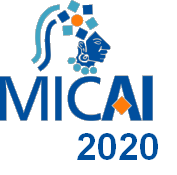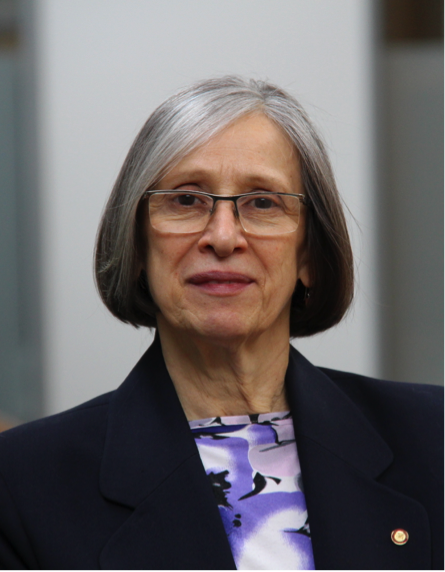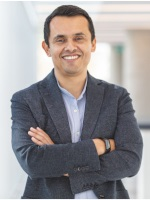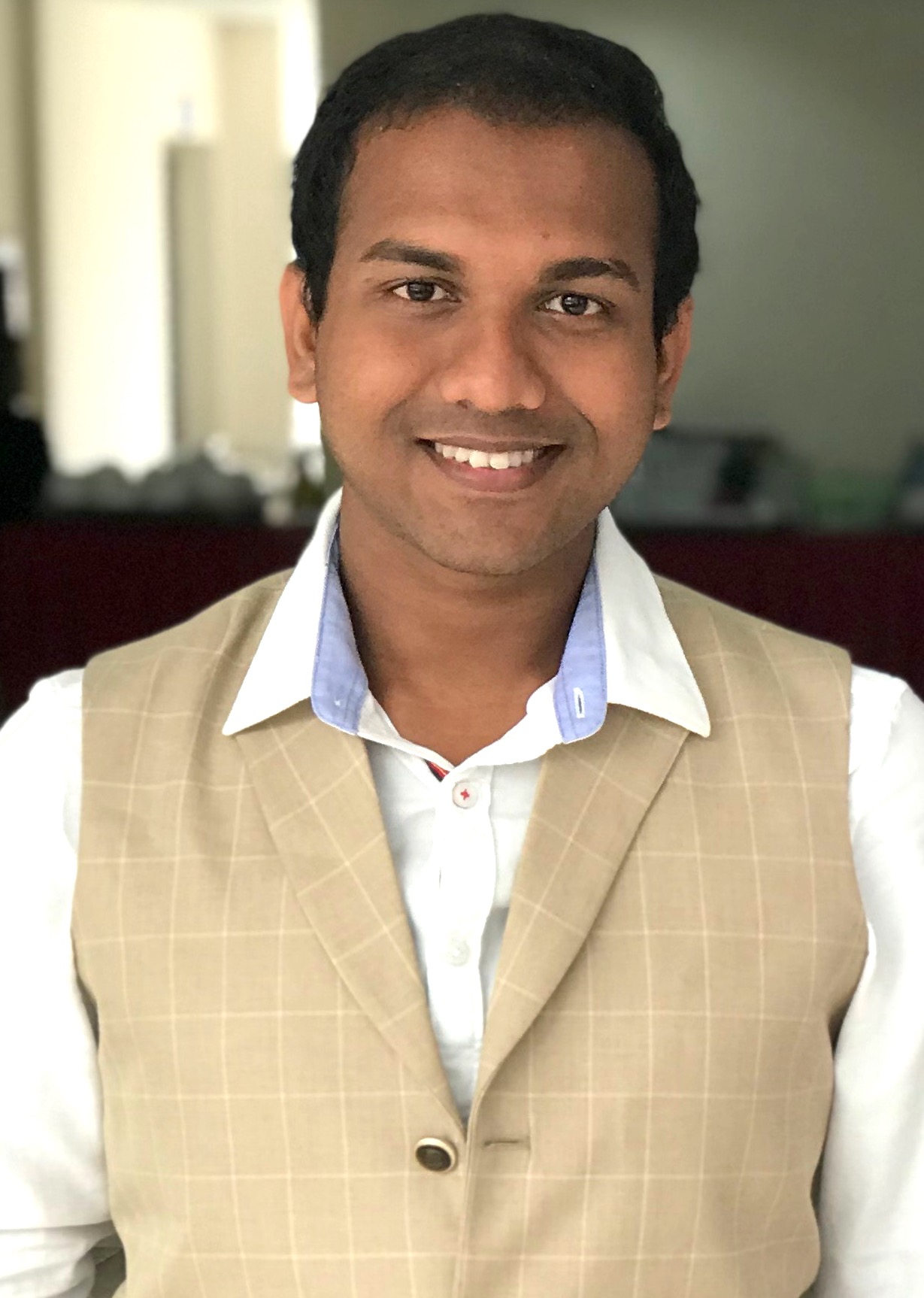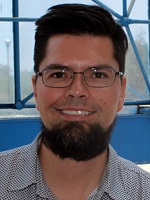|
|
19th Mexican International Conference on Artificial Intelligence
October 12 to 17 • Mexico City, Mexico
Given the
current contingence because of COVID, the Conference Committee
decided to move MICAI 2020 to a
virtual modality.
The safety and health of the participants is a priority.
Also, due to this situation, the conference registration fee for
each paper was
reduced to
$2,000.00 MXN or $100.00 USD.
Publications:
Springer LNAI;
RCS and invitation to special issue of journal:
Applied Sciences (JCR Q2, Impact Factor 2.474).
A reduced number of selected papers will be
published in
Computación y Sistemas
and Polibits.
MICAI 2020 Proceedings Vol. 2 (LNAI 12469)
Keynote speakers:
Ljiljana Trajkovic, Pedro Larrañaga, Manuel Morales, Soujanya
Poria, Hiram Calvo and Mario Köppen.
Collocated: Workshops /
Call for Workshops,
Tutorials/
Call for Tutorials,
Doctoral Consortium/Call for Doctoral Consortium
MICAI was
characterized by Springer as premier conference in Artificial
Intelligence. It is a
high-level peer-reviewed international conference covering all areas of
Artificial
Intelligence, traditionally held in
All previous editions of MICAI were published in Springer LNAI (WoS, Scopus, EI). At past MICAI events, extended versions of a considerable number of the LNAI papers were invited to special issues of journals, including ISI JCR-indexed journals; see for example a special issue on MICAI of Expert Systems with Applications. Recent MICAI events received over 300–400 submissions from over 40 countries each, with acceptance rate around 25% for the main session.
Publication: Papers accepted for long oral presentation will be published by Springer in a volume of the series Lecture Notes in Artificial Intelligence (LNAI). Best papers awards will be granted to the 1st, 2nd and 3rd places. Special issues of journals are anticipated for best papers. Extended versions of selected papers are expected to be invited to special issues of journals, including ISI JCR-indexed journals. Traditionally at MICAI, the results of the SMIA Best Thesis in Artificial Intelligence Contest are announced.
|
Deadline extension: July 24 |
| July 24, 2020 |
Uploading of full text of registered papers for blind review. |
|
| July 31, 2020 |
|
Notification. |
| August 14, 2020 |
|
Camera-ready and payment deadlines for LNAI papers only |
| Publication | Camera ready deadline |
| LNAI | August 14 |
| CyS | August 23, to be published in September 2020 |
| CyS | November 13, to be published in December 2020 |
| RCS | August 30 |
| Polibits | August 30 (contact the editor if you need more time) |
Topics of interest are all areas of Artificial Intelligence, including but not limited to:
|
|
The registration fee amount for authors is USD 100.00 or MXN 2,000. This includes one paper only. If one author has more than one accepted paper, in order for the papers to be published the fee is to be paid for each of them independently. If you pay via bank transfer or PayPal, you should add the bank fees, so the amount that you will pay will be higher. In summary:
|
|
Bank from Mexico | Bank from abroad | PayPal |
| For each paper |
MXN 2,000 |
USD 100 plus bank fees |
USD 105 |
| Additional page (use a single payment) |
MXN $200.00 | USD 10 plus bank fees | USD 10 |
This fee includes publication of one paper (up to the page limit) in any of the proceedings volumes or journal issues derived from the conference.
|
Bank transfer (preferred for Mexican authors) Please transfer
the fee to any of the following accounts in Mexican pesos:
You can find more details here.
|
|
Credit card or PayPal payment
(from abroad) Now, it is enabled! You can find more details here. If you pay from abroad, please make
sure that the complete fee is deposited to our account; |
We solicit original research papers written in English. The submissions must not have been previously published or be under review for another conference or journal. Only complete and finished papers will be reviewed, not abstracts. After your paper is accepted you will have a chance to improve it according the comments of the reviewers, but the reviewers will assume that the text that they are reading is the text that is to be published, with the only changes they explicitly request (as opposed to reviewing a draft or abstract). In particular, the papers must be submitted in the required format. We reserve the right to reject without review the submissions that do not follow the format guidelines.
Submission procedure. Submissions are received electronically. The submission and reviewing procedure is handled the the EasyChair system. To submit a paper:
If you have not a user of the EasyChair system, you will need to register using the "I have no EasyChair account" button. Please do not send us your submissions by email. Please contact us in case of problems.
Submission is done in two phases. First, by the expression of interest deadline, we only need the tentative title and a draft abstract of your paper (you can change this later); they will be used only to reserve the appropriate reviewers for your paper - why not doing it right now? Later, by the full paper submission deadline, we will need the full text of your paper, as a PDF file. Both the draft abstract and full paper are uploaded via the EasyChair system. If you read this late, or need more time, you can upload your paper while the system is open, or contact us for late submissions.
Submission of the paper assumes that at least one author will register at the conference and present an accepted paper or poster. Full registration fee should be paid for each accepted paper.
Size. Registration fee for authors includes publication of a paper of up to 12 pages, though more pages can be used for a small additional fee. We strongly encourage authors to use as many pages as really necessary for an excellent paper: longer papers have better impact and receive more citations. Do not sacrifice the quality of your paper to squeeze it into the page limit.
For each page that exceeds this limit small extra fee of USD 10 will be charged. If your page exceeds 20 pages, please contact the organizers first. The additional fee is charged for the pages exceeding the page limit in either the version submitted for review or in the camera-ready version, whichever is greater. In particular, you must not shorten the camera-ready version in comparison with the version submitted for review unless the reviewers required this (contact us if you feel you should do shorten it; in any case this would not reduce the fee). However, we encourage you to use as many pages as you really need for an excellent paper, even if you will pay a very small fee for it -- that it, we recommend you not to sacrifice clarity and completeness of your paper for the page limit.
Double blind review policy: the review procedure is double blind. Thus the papers submitted for review must not contain the authors' names, affiliations, or any information that may disclose the authors' identity (this information is to be restored in the camera-ready version upon acceptance). In particular, in the version submitted for review please avoid explicit auto-references, such as "in [1] we show" -- consider "in [1] it is shown". I.e., you may cite your own previous works provided that it is not deducible from the text that the cited work belongs to the authors. When citing your previous work, please keep the names:
Incorrect: In [1] we have shown ...
1. <Hidden for review>, Syntactic Structures, The Hague, Mouton, 1957.Correct:
In [1] it was shown ...
1. Chomsky, N., Syntactic Structures, The Hague, Mouton, 1957.
Format. The submissions are to be formatted in strict accordance with the Springer LNCS format guidelines. You can find here some useful advice on formatting.
LNCS templates and guidelines
click here.
RCS templates
click
here
Workshops, Tutorials, Doctoral Consortium
Workshops and tutorials will be organized in conjunction with MICAI 2020; see Call for Workshops, Call for Tutorials, Call for Doctoral Consortium.
|
To get your invoice for the workshops send an email to "micai2020 at smia.mx" with the information in the subject with format "INVOICE - Workshop NAME paper # TITLE" and please attach your payment proof as well as your tax data including the MEXICAN SAT classification, payment classification, quantity and postal address). 13TH Workshop on Intelligent Learning Environments (WILE 2020) 13th Workshop of Hybrid Intelligent Systems (HIS 2020) 2nd Workshop on New Trends in Computational Intelligence and Applications (CIAPP 2020) 6th Workshop on Intelligent Decision Support Systems for Industry (WIDSSI 2020) Tutorials :León Palafox | Machine Learning for financial application | Universidad Panamericana Bedrich Benes | Inverse Procedural Modeling in Computer Graphics | Purdue University |
Convocatoria mejores Tesis de Maestria y Doctorado
MICAI 2020 will be held in Mexico City, Mexico: Universidad Panamericana.
|
The general schedule of the conference will be as follows:
|
Conference chair: Félix Castro (UAEH - fcastroe AT gmail.com)
Program chairs:
Oscar Herrera (UAM - oha AT azc.uam.mx)
Ma. Lourdes Martínez (UP - lmartine AT up.edu.mx)
Local chair:
Hiram Ponce (UP - hponce AT up.edu.mx)
Program Committee
|
Alan Calderón Velderrain Alejandro Rosales Alejandro Israel Barranco Gutiérrez Alexander Bozhenyuk Alexander Gelbukh Alicia Morales-Reyes Alisa Zhila Andre de Carvalho Andrés Espinal Angel Sanchez Ángel Rodríguez Liñan Anilu Franco-Arcega Antonio Neme Antonio Sanchez Antonio Marín Hernández Ari Yair Barrera-Animas Asdrubal López-Chau Aurelio Alejandro Santiago Pineda Aurora Torres Bella Citlali Martínez-Seis Betania Hernandez-Ocaña C. Alberto Ochoa-Zezatti Cesar Núñez-Prado César Medina-Trejo Christian Sánchez-Sánchez Claudia Gomez Crina Grosan Daniela Moctezuma Dante Mújica-Vargas David Tinoco Davide Buscaldi Denis Filatov Diana Laura Vergara Diego Uribe Dora-Luz Flores Eddy Sánchez-Delacruz Edgardo Manuel Felipe Riverón Eduardo Gomez-Ramirez |
Efraín Solares Lachica Efrén Mezura-Montes Eloisa Garcia Elva Lilia Reynoso Jardón Eric S. Tellez Erikssen Aquino Ernesto Moya-Albor Felix Castro Espinoza Fernando Gudiño Fernando Von Borstel Francisco Viveros-Jimenez Gabriel Gonzalez Gabriel Sepúlveda Cervantes Garibaldi Pineda García Gemma Bel-Enguix Genoveva Vargas Solar Gerardo Loreto Gibran Fuentes-Pineda Gilberto Ochoa Ruiz Gilberto Rivera-Zarate Giner Alor Hernandez Grigori Sidorov Guillermo Morales-Luna Guillermo Santamaria Gustavo Arroyo Haruna Chiroma Helena Gómez Heydy Castillejos Hiram Calvo Hiram Ponce Horacio Rostro Ignacio Arroyo-Fernández Igor Bolshakov Ildar Batyrshin Ilia Markov Iris Iddaly Méndez-Gurrola Iskander Akhmetov Ismael Osuna-Galán |
Israel Tabarez Ivan Meza Ivandré Paraboni J. Victor Carrera-Trejo Joaquín Gutiérrez Juaguey Joel Ilao Jorge Hermosillo Jorge Jaimes Jorge Reyes Jose Valdez José A. Reyes-Ortiz José Alberto Hernández José Ángel González Fraga José Antonio León-Borges José Carlos Ortiz-Bayliss José David Alanís Urquieta Juan Martínez Miranda Juan Jose Flores Karinaruby Perez-Daniel Katya Rodriguez-Vazquez Laura Cruz-Reyes Leticia Flores-Pulido Lourdes Martínez Luis Torres Treviño Luis Humberto Sánchez Medel Luis-Carlos González-Gurrola Maaz Amjad Mario Locez-Loces Masaki Murata Merlin Teodosia Suarez Miguel Gonzalez-Mendoza Miguel Ángel Zúñiga García Miguel Ángel Alonso Arévalo Mukesh Prasad Nailya Kubysheva Nareli Cruz Cortés Navonil Majumder Nestor Velasco Bermeo |
Noé Alejandro Castro-Sánchez Noel Enrique Rodriguez Maya Norberto Castillo García Obdulia Pichardo Ofelia Cervantes Olga Kolesnikova Omar Montaño Rivas Omar Jehovani López Orozco Oscar Herrera Paula Hernández Hernández Pedro Pablo Gonzalez Piere Baldi Rafael Batres Rafael Guzman Cabrera Rafaela Silva Ramon Barraza Ramon F. Brena Roberto Vázquez Rodrigo Lopez Farias Roilhi Frajo Ibarra Hernández Roman Anselmo Mora-Gutierrez Romeo Sanchez Nigenda Ruben Cariño Escobar Sabino Miranda-Jiménez Salvador Godoy-Calderon Saturnino Job Morales Escobar Saúl Zapotecas Martínez Segun Aroyehun Sergio Padilla Sofia N. Galicia-Haro Tania Aglaé Ramírez Del Real Vadim Borisov Valery Solovyev Vicente Garcia Victor Lomas-Barrie Yasmin Hernandez Yasunari Harada Yenny Villuendas Rey |
|
|
Download the famous |




Not to be confused with
MICCAI.
